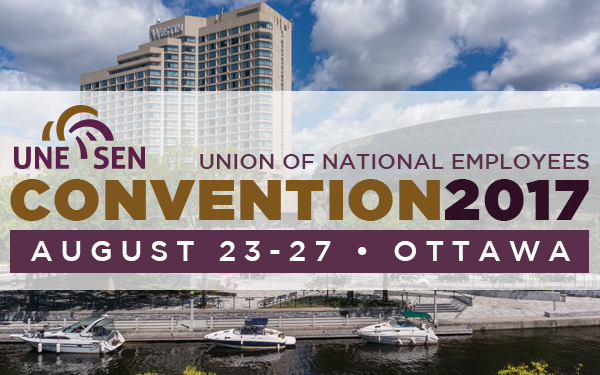
The Union of National Employees 2017 Convention will be held at the The Westin Hotel in Ottawa, Ontario from August 23 to 27, 2017. Before we start paving the way forward for our union, there are a few important things you need to do.
Make sure your Local is in conformance
You can only attend convention if your Local is in conformance. For a complete list of documents needed from your Local, see the convention checklist.
Elect delegates and their alternates
Delegates and alternates are elected during general local meetings. The number of delegates per Local is determined by the number of members it has in good standing six months before the start of convention (bylaw 6, section 12):
- Four to 100 members: one delegate;
- One delegate for each 100 members or portion thereof to a maximum of five delegates.
UNE will cover expenses such as loss of salary, travel, accommodations, meals and family care. For more information on this, please consult the cheat-sheet. Members with physical limitations, allergies, environmental sensitivities or special dietary requirements will have the opportunity to identify accommodation needs during the registration process.
Observers
Locals can also send observers to convention at the Local’s expense. These members can attend convention, but they can not participate in debate or vote. There is a $75 registration fee for observers to cover the cost of convention materials.
Submit Credential Forms
Locals must submit credential forms for each of their delegates, alternates and observers. Credential forms for delegates and alternates must include a copy of the general local meeting minutes showing the election of those members as delegates or alternates. The credential forms are included on our convention page. These forms must be emailed to events@une-sen.org or faxed and marked (credential form) to the attention of Suzanne Boucher at 613-560-4208.
Convention Committees
Delegates to convention will be able to express their interest in participating in one of the three convention committees tasked with reviewing resolutions submitted to convention. These committees will meet in Ottawa from June 4 to 6, 2017.
Registration Deadline
To be recognized as a delegate to convention, members must complete the online registration (to be opened in February) and submit the following documents by April 21, 2017 at 4 p.m. Eastern Standard Time;
- Credential forms, including meeting minutes showing election of delegates and alternates
- Local financial documents in conformance with UNE Bylaws and Policies;
Members who miss the deadline WILL NOT be able to participate on convention committees and are considered late delegates.
Late delegates are seated at convention by way of procedural motion during the early stages of the opening of our Convention.
Questions about convention logistics and registration?
Please contact Suzanne Boucher at events@une-sen.org or by phone at 613-560-4359 or 1-800-663-6685.
RESOLUTIONS
Option 1
Locals should appoint a convention resolutions committee; these are normally made up of three to five members. Some Locals may prefer to appoint a committee for each resolution topic: constitution and bylaws, finance, and general resolutions.
Your Local should issue a notice asking members to submit resolutions to your convention resolutions committee. Allow plenty of time for the committee to prepare a report. Members of the committee should also be encouraged to submit their own resolutions.
Each committee’s report and additional resolutions should be presented during a general membership meeting. This meeting should provide ample time to debate resolutions before members cast a vote.
Option 2
Any member in good standing can submit a resolution to Convention by having it co-signed by five other members in good standing.
Submit your resolution online
You should submit your resolutions electronically on our website. The online submission form can be found here.
Completing this process significantly reduces the time required to prepare resolutions for our committees’ review. If you do not have internet access, you can submit your resolutions by mail or fax.
Submit supporting documentation
The resolutions you submit online must also be supported by hardcopy versions of either the signed minutes verifying that the resolution was adopted during a general membership meeting or the resolutions form co-signed by five other members in good standing. You can download the resolution template on our convention page here.
Please send these hard copies to the attention of Ateau Zola by email at resolutions@une-sen.org, by fax at 613-560-5208, or by mail at:
Union of National Employees
900-150 Isabella St.
Ottawa, ON
K1S 1V7
Resolutions received after April 21, 2017 at 4 p.m. Eastern Standard Time will be deemed late and will be dealt with after all other resolutions have been dealt with.
Questions about resolutions?
Please contact Ateau Zola at resolutions@une-sen.org or by phone at 613-560-4343 or 1-800-663-6685.
In solidarity,
Doug Marshall
National President
Union of National Employees, PSAC







 When will we vote on the deal?
When will we vote on the deal?